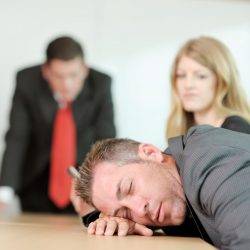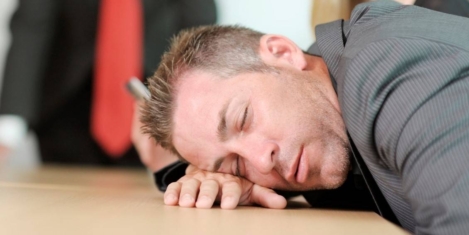February 27, 2018
Unnecessary meetings costing UK business more than £191bn a year
 UK office workers are spending almost an entire working day every week attending and preparing for unnecessary meetings, according to a new survey from meeting technology firm eShare. The average office worker spends 10 hours 42 minutes every week, preparing for and attending 4.4 meetings, with 2.6 of those deemed unnecessary. With the average meeting revealed to have 6.8 attendees, this equates to annual staff costs for unnecessary meetings per business of over £35,000, based on ONS average earnings data. With 5.4 million businesses in the UK, this means the total staff cost per year is more than £191bn, according to the firm.
UK office workers are spending almost an entire working day every week attending and preparing for unnecessary meetings, according to a new survey from meeting technology firm eShare. The average office worker spends 10 hours 42 minutes every week, preparing for and attending 4.4 meetings, with 2.6 of those deemed unnecessary. With the average meeting revealed to have 6.8 attendees, this equates to annual staff costs for unnecessary meetings per business of over £35,000, based on ONS average earnings data. With 5.4 million businesses in the UK, this means the total staff cost per year is more than £191bn, according to the firm.













 Corporate real estate departments need to become more effective partners in the agile transformation of their broader organizations., claims a new survey conducted by CBRE, in partnership with CoreNet Global. When describing Portfolio Agility, i.e. the ability to rapidly adapt, scale and reposition the organization’s real estate portfolio to support shifting enterprise needs, 67 percent consider portfolio agility as the most important type of agility for business success, yet only 14 percent consider themselves highly agile in this area. The most prevalent portfolio agility practices included negotiating flexible space options in the lease, seeking shorter and/or more flexible lease terms, supporting an enterprise-wide flex-work program and delivering free address work environments. The report states that new workplace guidelines for efficiency have altered the way companies plan for density and more occupiers are incorporating third-party ‘agile space’ into their overall real estate strategy.
Corporate real estate departments need to become more effective partners in the agile transformation of their broader organizations., claims a new survey conducted by CBRE, in partnership with CoreNet Global. When describing Portfolio Agility, i.e. the ability to rapidly adapt, scale and reposition the organization’s real estate portfolio to support shifting enterprise needs, 67 percent consider portfolio agility as the most important type of agility for business success, yet only 14 percent consider themselves highly agile in this area. The most prevalent portfolio agility practices included negotiating flexible space options in the lease, seeking shorter and/or more flexible lease terms, supporting an enterprise-wide flex-work program and delivering free address work environments. The report states that new workplace guidelines for efficiency have altered the way companies plan for density and more occupiers are incorporating third-party ‘agile space’ into their overall real estate strategy.


 In a workplace dominated by insecurity, gig work and intelligent machines we need to improve our understanding of their potential impact on health, safety and wellbeing claims a new report.
In a workplace dominated by insecurity, gig work and intelligent machines we need to improve our understanding of their potential impact on health, safety and wellbeing claims a new report. 



 The majority of employers want students to have work experience to help acquire leadership skills, yet not even a third say they actually offer placements. This is according to new research published today by the Chartered Management Institute (CMI) which is calling on employers to collaborate with business schools and universities in creating courses to provide future leaders. The Chartered Management Institute’s 21st Century Leaders report found that seven in 10 (70 percent) of prospective employers now want management, enterprise and leadership modules made available to all higher education students to improve their work-ready skills. Two-thirds (66 percent) of employers say they want to see graduates achieve professional qualifications as well as their main degree. The growing emphasis on graduate employability has been driven by employers concerned about skills shortages, with 82 percent of employers reporting problems recruiting managers. A majority of managers (85 percent) said work experience should be embedded into courses to help develop these skills and make students more employable. Yet only 29 percent of businesses work with business schools to offer placements.
The majority of employers want students to have work experience to help acquire leadership skills, yet not even a third say they actually offer placements. This is according to new research published today by the Chartered Management Institute (CMI) which is calling on employers to collaborate with business schools and universities in creating courses to provide future leaders. The Chartered Management Institute’s 21st Century Leaders report found that seven in 10 (70 percent) of prospective employers now want management, enterprise and leadership modules made available to all higher education students to improve their work-ready skills. Two-thirds (66 percent) of employers say they want to see graduates achieve professional qualifications as well as their main degree. The growing emphasis on graduate employability has been driven by employers concerned about skills shortages, with 82 percent of employers reporting problems recruiting managers. A majority of managers (85 percent) said work experience should be embedded into courses to help develop these skills and make students more employable. Yet only 29 percent of businesses work with business schools to offer placements.
 A new report a new report by the Centre for Ageing Better has called for government and employers to support older workers to stay in work for longer, help those who have fallen out of work involuntarily to return and to create workplaces that work for all, irrespective of age. The report claims that ensuring older workers are able to stay in good quality employment is essential to the future of the UK economy and will relieve pressure on public finances. It makes some key recommendations that include access to flexible working hours and workplace adaptations to help people manage pressures such as caring responsibilities and health conditions, which become more prevalent with age. It also calls for equality of opportunities in the workplace as older workers in the UK experience age discrimination in recruitment and progression. They are less likely to be offered opportunities for development – across the whole of the OECD only Turkey and Slovenia have lower levels of on-the-job training for older workers than the UK. Research shows they are also the most likely to be stuck on low pay and feel most insecure about their jobs.
A new report a new report by the Centre for Ageing Better has called for government and employers to support older workers to stay in work for longer, help those who have fallen out of work involuntarily to return and to create workplaces that work for all, irrespective of age. The report claims that ensuring older workers are able to stay in good quality employment is essential to the future of the UK economy and will relieve pressure on public finances. It makes some key recommendations that include access to flexible working hours and workplace adaptations to help people manage pressures such as caring responsibilities and health conditions, which become more prevalent with age. It also calls for equality of opportunities in the workplace as older workers in the UK experience age discrimination in recruitment and progression. They are less likely to be offered opportunities for development – across the whole of the OECD only Turkey and Slovenia have lower levels of on-the-job training for older workers than the UK. Research shows they are also the most likely to be stuck on low pay and feel most insecure about their jobs.
 The construction industry needs new talent and skills to help in the adoption of new technologies to meet the challenges of digital transformation. It must also become more diverse, including increasing the percentage of women in the industry. These are the recommendations of a new report from the World Economic Forum, developed in collaboration with The Boston Consulting Group (BCG), Shaping the Future of Construction: An Action Plan to solve the Industry’s Talent Gap. The report argues that the Infrastructure and Urban Development (IU) industry has failed to innovate as quickly as other sectors, resulting in stagnating productivity and negative effects on the economy, society and the environment. An ongoing industry-wide shortage of qualified workers is among the key reasons for this issue. It has undermined project management and execution, adversely affecting cost, timelines and quality. It also has impeded the adoption of new digital technologies, such as building information modelling (BIM), automated equipment and cloud-based collaboration tools, which could improve productivity. The report provides twelve key actions which needs to be implemented to close the structural talent gap of the construction industry.
The construction industry needs new talent and skills to help in the adoption of new technologies to meet the challenges of digital transformation. It must also become more diverse, including increasing the percentage of women in the industry. These are the recommendations of a new report from the World Economic Forum, developed in collaboration with The Boston Consulting Group (BCG), Shaping the Future of Construction: An Action Plan to solve the Industry’s Talent Gap. The report argues that the Infrastructure and Urban Development (IU) industry has failed to innovate as quickly as other sectors, resulting in stagnating productivity and negative effects on the economy, society and the environment. An ongoing industry-wide shortage of qualified workers is among the key reasons for this issue. It has undermined project management and execution, adversely affecting cost, timelines and quality. It also has impeded the adoption of new digital technologies, such as building information modelling (BIM), automated equipment and cloud-based collaboration tools, which could improve productivity. The report provides twelve key actions which needs to be implemented to close the structural talent gap of the construction industry.







